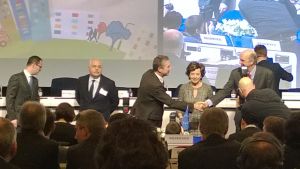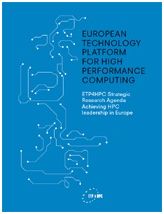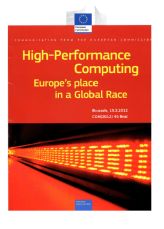 |
|||||


Home > News > Members and Partners News > ETP European Technology Platform for High Performance Computing
| September 4, 2015 - The results of first H2020 HPC calls have been known Spring of 2015: 19 technological RIA “FETHPC” projects, 8 Centres of Excellence for Computing Applications – in different areas – have been granted a total funding of almost 140 M€. The FETHPC call had been mainly inspired by ETP4HPC 2013 Strategic Research Agenda recommendations (SRA). In parallel, in 2014-2015, ETP4HPC also prepared new recommendations for 2016-2017 H2020 calls, acknowledged by the European Commission. ETP4HPC is now in the process of updating its SRA in detail, this is planned for Fall of 2015 and meant to be a reference document for 2016-2017 calls – which should be made public before the end of 2015. Centres of Excellence, which are about to start, will also be involved in the HPC Public Private Partnership (cPPP) with the EC and ETP4HPC, before end of 2015 – this cPPP is the umbrella for the EU HPC global strategy. EXDCI, a global European HPC coordination action funded by H2020 as well, has also been kicked-off beginning of September. ETP4HPC, as well as more than 20 other entities, are associated to PRACE for this ‘eXtreme Data and Computing Initiative’, a 30 month action. EXDCI will support the continuation of ETP4HPC SRA efforts as well as a full update of PRACE 2012 Scientific Case for HPC, and a global coordination of HPC roadmaps in Europe, actions for the support of HPC talent generation and SMEs, international cooperation and eventually monitoring and impact assessment of H2020 HPC programme – especially in socio-economic terms. |
||
December 2014 -
In the end of 2013, ETP4HPC had 46 members and it grew to 64 members by the end of 2014, a sustainable and dynamic growth, enrolling more industrials, SMEs and research organisations ( cf picture). Different ETP4HPC Work Groups were active during 2014:
ETP4HPC actively participated to 2014 big HPC or ICT events (ISC, SC, TERATEC Forum in France, CAE conference in Italy, ICRI in Greece, PRACE Days in Spain) and to a number of topical workshops and events organized by the EC:
2014 was also the opportunity to develop and consolidate links with other HPC stakeholders (PRACE, EESI, SKA, BigDataValue and Big Data cPPP, ECSEL, US DOE, RIKEN…). |
||
December 2013 – A productive 2013 year for ETP4HPC, with several important achievements and milestones
The cPPP is an agreement setting a framework to implement the EC policy in HPC first expressed in February 2012 commun ication [4] and confirmed during May 2013 Council of Competitiveness. This agreement makes HPC visible and supported over the whole lifespan of H2020 – indicative global EC contribution of 700 M€ over 7 years, beyond the ca. 100 M€ in the aforementioned FETHPC 2014-2015 calls. The cPPP is open to future Centres of Excellence for Computing Applications (CoEs) as well as to PRACE to join in. The EC is fostering the creation of CoEs in the e-infrastucture calls of H2020 Excellent Science pillar.
|
||
September 2013 - European Technology Platform for High Performance Computing ETP4HPC published its first Strategic Research Agenda (SRA).
|
||
Paris, september 29, 2012
An industry-led Forum, ETP4PHC has already produced a Vision Paper in March 2012, and is currently preparing a Strategic Research Agenda (SRA) for end of 2012, to propose R&D programmes to increase the value created in Europe from future HPC systems. Working Groups have been launched with experts from member or non-member organizations, spanning a diversity of topics:
A first workshop gathered these Working Groups end of June in Paris. Another one is taking place early October in Barcelona, including a one-day dialogue with a panel of European industrial end-users, representing different domains and usages of HPC. This dialogue is meant to put the ETP4HPC SRA reflections in the perspective of the whole HPC value chain and its economic and societal outcomes through the applications of HPC technologies. End of September an ETP4HPC delegation met Neelie Kroes, European Commissioner for Digital Agenda, in Brussels. Beyond acknowledging ET4HPC initiative and confirming the Commission interest in HPC as an enabler of innovation and competitiveness for Europe, Ms Kroes expressed her high expectations: ETP4HPC is to be actively contributing to the definition of Horizon 2020 program that will define the future European research objectives. To find out more : www.etp4hpc.eu |
||
| Barcelona, 10th November 2011
Major European suppliers of High Performance Computing (HPC) technologies, Allinea, ARM, Bull, Caps Entreprise, Eurotech, ParTec, STMicroelectronics and Xyratex associated with HPC research centres BSC, CEA, CINECA, Fraunhofer, Forschungszentrum Juelich and LRZ have decided to combine forces to create a European Technology Platform (ETP), building on the previous work of PROSPECT and Teratec. in all the segments of the HPC solution supply chain. It will strengthen European competitiveness in HPC, a key capability for future research and innovation. The effort will be beneficial to a wide range of social and economic challenges. HPC is an indispensable instrument to resolve problems of the highest complexity that require extremely large and very efficient computational and storage capabilities for activities such as modelling natural phenomena (weather, climate change or epidemics), optimizing energy resources, researching novel materials and shortening engineering development cycles, which would foster innovation across the region. taking advantage of European industry strengths to increase the value created in Europe from future HPC systems. Currently the design of supercomputer solutions face significant challenges such as management of the extreme parallelism experienced in HPC architectures or the reduction of the power consumption, addressing these presents opportunities for European players to improve their position in the worldwide market. that will be open to any businesses, groups or individuals who have R&D activities in any aspect of HPC and are located in Europe. The goal is to bring together all the research forces in Europe including R&D activities of SMEs, European corporations, international corporations and research centres to benefit from their competences and to foster these capabilities by proposing an ambitious research plan to the European Commission. The ETP will prepare the Strategic Research Agenda seeking acknowledgement from the European Commission to provide inputs towards the Horizon 2020 program that will define the future European research objectives. The impressive set of competencies of the members gathered on this initiative show that Europe can be at the forefront of the HPC industry in coming years if an ambitious R&D program is |
||



